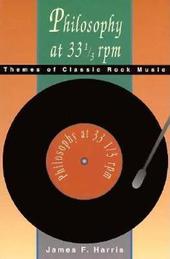
|
Philosophy at 33 1/3 rpm: Themes of Classic Rock Music
Paperback / softback
Main Details
| Title |
Philosophy at 33 1/3 rpm: Themes of Classic Rock Music
|
| Authors and Contributors |
By (author) James Harris
|
| Physical Properties |
| Format:Paperback / softback | | Pages:280 | | Dimensions(mm): Height 228,Width 152 |
|
| Category/Genre | Rock and Pop
Western philosophy from c 1900 to now |
|---|
| ISBN/Barcode |
9780812692419
|
| Classifications | Dewey:781.66 |
|---|
| Audience | |
|---|
|
Publishing Details |
| Publisher |
Open Court Publishing Co ,U.S.
|
| Imprint |
Open Court Publishing Co ,U.S.
|
| Publication Date |
28 January 1999 |
| Publication Country |
United States
|
Description
True friendship, true community, social and sexual alienation, the death of God, the importance of the present momnet, individual autonomy, the corruption of the state, revolution, the end of the present age -- such are the intellectual themes of classic rock. Sixties rock music left behind the harmless bubblegum and surfing ditties of the 1950s to become a vehicle for the thoughtful commentary upon the human condition. Theories and motifs from philosophy, theology, and literature were reshaped, refracted, and transfigured in this intelligent new popular art form. Classic rock, argues James harris, should be taken as seriously as the loftiest creations of art and literature. In 'Philosophy at 33 1/3 rpm,' he lays the groundwork for an informed appreciation by exhibiting philosophical themes in the finest rock songs. Professor Harris's examples encompass all the major rock artists of the classic period (1962-1974), including Paul Simon, Elton John, Pink Floyd, The Grateful Dead, Bob Dylan, The Moody Blues, The Rolling Stones, The Beatles, The Kinks, Cat Stevens, Crosby, Stills, Nash, and Young, The Who, Jefferson Airplane, and Joni Mitchell. His analyses draw upon the ideas of Aristotle, Bonhoeffer, Camus, Descartes, Freud, Kant, Laing, Marcuse, Marx, Nietzche, Nozick, Rousseau, Sartre, Thoroeau, and Tillich, as well as the Bible and other scriptures, to situate the preoccupations of the classic rock lyricists in the Western intellectual tradition.
|